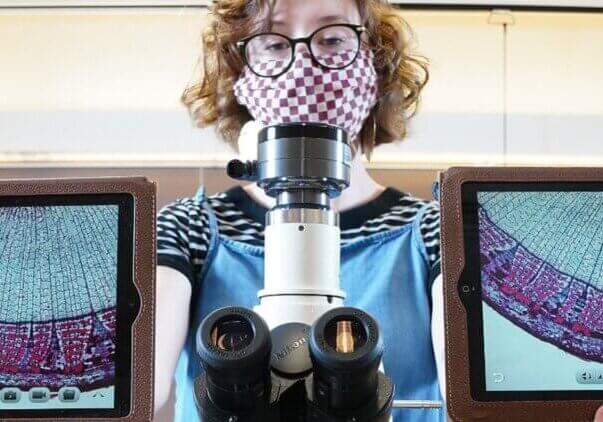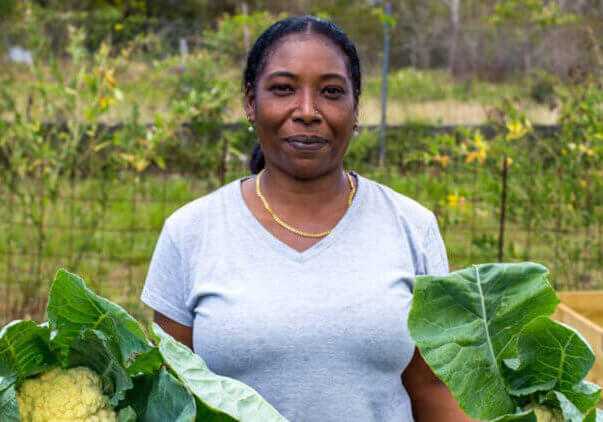E
ager to learn more about her field, Michaela Covington enrolled in Purdue’s Master of Science Biotechnology Innovation & Regulatory Science (BIRS) program six months after graduating from college, becoming the youngest person in the summer 2020 graduating class.
Now a regulatory reporting specialist at Cook Medical in the endoscopy unit, Covington is grateful for the invaluable personal growth she gained through the BIRS program. She reflects with pride on her accomplishments in the BIRS program and her excitement to share her experience with family and friends.

“I did something to make my family proud. A very small percentage of African Americans have graduate degrees. It’s an honor to be able to say I did this, I finished this and I can be an inspiration to other members of my family,” said Covington.
The BIRS faculty members, located in the Purdue Agriculture and Biological Engineering Department, teach important aspects of biotechnology innovation within the context of regulatory science and quality assurance. The hybrid program consists of in-person and online learning experiences, with an emphasis on leadership for the working professional.
“The program faculty were very understanding and flexible because they understood we are all working adults. It wasn’t only the flexibility of classes or the hybrid model, but the flexibility of the staff that helped me succeed. This program is very beneficial for the working professional who wants an education but fears they don’t have the time,” said Covington.
A highlight for Covington was meeting people in the program and through guest lectures.
“Instantly, you meet and work with people who have a totally different perspective than you. We had a wide array of industries, from quality assurance to project managers and manufacturing, all in one room.
“The industry interactions with guest lectures brought new perspectives to the classes. You learn examples that aren’t in a textbook. We made professional connections and created bonds with people that can help us along the way.”
During a guest lecture, Covington met her mentor, Myra Casey, a consumer safety officer and bio researching monitoring operations specialist for the United States Food and Drug Administration. She reflected on how inspiring it was to meet another successful Black woman in the regulatory field. Since that lecture, Casey has been an encouraging resource for Covington as she navigates her career.
“Be ready to do the work. It’s worth it, but be prepared to put in some effort. And don’t let the environment or people around you scare you from applying even if you’re younger. There is a learning curve and you can’t be afraid to speak up, but it’s OK even if you’re young in your career.”
Top 10 Reasons Purdue ABE has been #1 for 10 Years
The U.S. News and World Report Best Colleges recently announced that Purdue’s Department of Agricultural Biological Engineering (ABE) is the top-ranked undergraduate department in its discipline for the 10th year in a row. Purdue’s graduate ABE program was ranked first by U.S. News and World Report in 2019 for the ninth time in 10 years.
Read Full Story >>>Ag labs rise to COVID challenge
The COVID-19 pandemic is forcing many aspects of life on the Purdue campus to change. Faculty and graduate students are rising to the challenge, redesigning lab courses in creative and innovative ways.
Read Full Story >>>Purdue Farmer-to-Farmer Program Switches to Virtual Assignments
In April 2020, Purdue University’s International Programs in Agriculture (IPIA) and Purdue Cooperative Extension announced the USAID John Ogonowski and Doug Bereuter Farmer-to-Farmer (F2F) program to be implemented by Purdue University in Trinidad and Tobago over the next three years. A United States Agency for International Development (USAID) funded program, F2F provides technical assistance from U.S. volunteers to farmers, farm groups, agribusinesses, and other agriculture sector institutions in developing and transitional countries.
Read Full Story >>>Top 10 Reasons Purdue ABE has been #1 for 10 Years
The U.S. News and World Report Best Colleges recently announced that Purdue’s Department of Agricultural Biological Engineering (ABE) is the top-ranked undergraduate department in its discipline for the 10th year in a row. Purdue’s graduate ABE program was ranked first by U.S. News and World Report in 2019 for the ninth time in 10 years.
Read Full Story >>>Ag labs rise to COVID challenge
The COVID-19 pandemic is forcing many aspects of life on the Purdue campus to change. Faculty and graduate students are rising to the challenge, redesigning lab courses in creative and innovative ways.
Read Full Story >>>Purdue Farmer-to-Farmer Program Switches to Virtual Assignments
In April 2020, Purdue University’s International Programs in Agriculture (IPIA) and Purdue Cooperative Extension announced the USAID John Ogonowski and Doug Bereuter Farmer-to-Farmer (F2F) program to be implemented by Purdue University in Trinidad and Tobago over the next three years. A United States Agency for International Development (USAID) funded program, F2F provides technical assistance from U.S. volunteers to farmers, farm groups, agribusinesses, and other agriculture sector institutions in developing and transitional countries.
Read Full Story >>>

